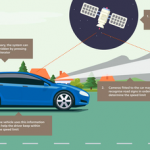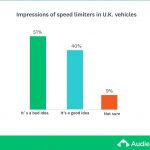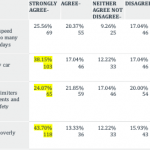This is a contributed guest post from SurveyMonkey Audience customer, Catherine Dawson, marketing director at CLM Fleet Management. Interested in a contributed post based on your own Audience research? Send a blog pitch to coletted@surveymonkey.com.
Intelligent Speed Assistance (ISA) technology—systems that detect local speed limits and prevent cars from exceeding them—may be required to be built into new cars across Europe starting in 2022.
At CLM Fleet Management, we noticed some strong views from individuals in the media, and decided to conduct some structured research to explore this topic further. The responses from drivers revealed strong opinions, suggesting that this mandate could be controversial if pursued further.

An ISA system enables cars to receive information via GPS and a digital map, so that the vehicle can limit its top speed according to the rules of the area. In addition to the data feed, there would be an onboard video camera capable of recognizing road signs, and a “black box” feature—like an aircraft flight recorder—to track driver behaviour.
We conducted a survey of almost 300 UK-based drivers to gather their views on the new technology.
A mix of support and distrust—but with some shared concerns
While it was clear that there was some support for ISA, it was also clear that there was an equal or greater resistance to the technology. We decided to post about the issue on social media as well, triggering some interesting debate.

Interestingly even among the supporters of the technology, many believed that it was a “step too far and is overly controlling.” We plan to do a follow-up survey to determine whether the ISA technology without the black box recorder would meet with broader support.
Respondents were asked to indicate the extent to which they agreed or disagreed with the following statements (with the highest responses highlighted):

More than 38% of responders indicated that they would avoid buying a car with ISA technology, indicating that the U.K. government, which has already signaled support of the technology, might consider reappraising its position—especially if the reticence to buy new cars impacts environmental concerns.
In addition to the multiple choice questions, respondents were also given the opportunity to share their opinions in their own language, resulting in a few groups proposing interesting alternatives to ISA.
1.More driver training
Some respondents argued for more driver training rather than penalties and technological aids or recording devices. Others thought that speed-controlled cars might result in less talented drivers.
“Unless you get caught speeding, or train for other types of vehicle license, there’s a good chance that you won’t have had any training since you passed your driving test and that isn’t a good thing.”
Some respondents also noted that they found other driver behaviors more dangerous than speeding. Some examples that came up were failing to signal, tailgating, last-minute merges.
A few people also commented that they would find driver training to be a more effective solution than limiting car speeds.
In CLM’s own space—fleet driving and management—driver training isn’t uncommon, but it usually comes after recorded errors, accidents or poor driver behavior.
2. Review of speed limits
Perhaps unsurprisingly, many people also had strong opinions about the existing speed limits. Many considered the current speed limits too low and outdated, and would receive the new technology more favourably if speed limits were reviewed before ISA introduction.
Others worried about potential fines and other penalties they might be liable to if ISA tracking technology was enabled.
3. More police
Some respondents felt that, if speeding is an issue, adding more police to the force would be more effective than adding speed-monitoring technology into cars.
What does it all mean for companies with corporate cars and vans, drivers, or employees who need to drive?
While the survey attracted respondents from all walks of life, the impact will be especially relevant to those in the fleet industry.
Professional drivers (depending upon their point of view) may opt to drive their own/older car instead of a newer or company one in order to avoid the limits or protect their privacy.
Already, many U.K. drivers are choosing to use their own cars in order to avoid the U.K.’s Benefit in Kind tax. ISA technology could increase this trend—which makes planning and supporting drivers tougher for fleet managers.
Fleet companies and other driving-related industries will need to review and plan new policies, particularly sections about employees driving their own cars on business. We’ll need to ensure that they are robust enough to support the relevant to the health and safety issues and consider the environmental repercussions of increasing opt-outs.
ISA technology may also cause the cost of new cars to increase, and may also cost more to maintain. Existing safety systems like adaptive cruise control, lane departure warnings, and heads up displays have already caused accident repair costs rise significantly. If it does become requisite, our industry will very likely be affected.
CLM’s Audience survey data has enabled us to 1) understand public sentiment and how it aligns with and validates our company’s viewpoint 2) source interesting perspectives about alternative solutions and 3) understand how public sentiment might affect the U.K. government’s decisions moving forward.
For more information on the survey findings, contact CLM via info@clm.co.uk



